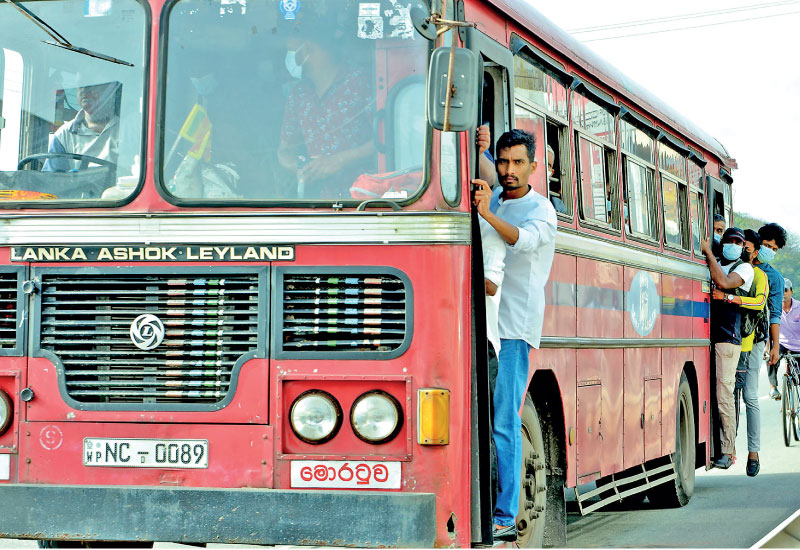Tuesday Feb 17, 2026
Tuesday Feb 17, 2026
Wednesday, 13 July 2022 00:35 - - {{hitsCtrl.values.hits}}

If there is an efficient and secure public transport system, sans overloading and delays, most high and middle income earners will not resort to private transport when travelling to office and school creating traffic congestions – Pic by Shehan Gunasekara
 About a year ago, the President made a clarion call to public sector employees to leave behind the two-year COVID-related setbacks and get ready to work with renewed energy, under ‘new- normals’. Now, in the face of the aggravating fuel crisis adding insult to injury, the President had to stress on the need to make the transport system more effective.
About a year ago, the President made a clarion call to public sector employees to leave behind the two-year COVID-related setbacks and get ready to work with renewed energy, under ‘new- normals’. Now, in the face of the aggravating fuel crisis adding insult to injury, the President had to stress on the need to make the transport system more effective.
According to University of Moratuwa Senior Professor Dr. Amal S. Kumarage, the available data, between 2014 and 2018 shows that we have spent on average $ 3,394 million annually on the country’s imports for essential items like food and beverage, dairy products and medicine while spending on average $ 3,269 million annually on fuel imports during the same period, when a barrel of oil was $ 50 approx. Now a barrel of oil costs more than $ 100 while other things have changed quite a bit since then. Thus, we spend more on fuel than what we spend to import everything else.
He further states that our road transport sector, takes up 63% approximately, of the total fuel import bill out of which current public transport consumes only 16% while carrying 50% of trips. This means the balance is gobbled up by the private vehicles. This is an alarming revelation especially in the context of the country’s current economic crisis.
The learned professor has shown several measures that have to be taken to mitigate this huge fuel crisis. Since it will take a considerable length of time to overcome the disastrous economic effects of the ‘COVID’ and the ‘Dollar’ crisis, it is imperative that we find more and more short and long term solutions to make people stronger in facing the difficult periods ahead. As most of us agree, if there is an efficient and secure public transport system, sans overloading and delays, most high and middle income earners will not resort to private transport when travelling to office and school creating traffic congestions.
In this regard, about two years ago, the writer looked at the other side of the coin and listed a few measures to rationalise public travelling in such a way that life becomes easier and more productive for office workers and schoolchildren whilst reducing the incidence of ‘community transmission of COVID via public transport between districts/provinces.
My suggested steps towards meeting the said ends were published in the press and copies were repeatedly sent to the political and other concerned authorities. Since the ‘Dollar Crisis’ has now triggered a massive fuel scarcity, I wish to reiterate the following short and long-term, simple, cost-saving, steps for implementation as practically as possible, after explaining to and convincing the respective trade unions, employers, school authorities and the parents, of the dire long-term need for adopting ‘new-normals’ in office, school and in our own lifestyles.
Office workers
1)As far as possible, assign them to offices/factories located closest to their residences within the district/province. The transfer policies have to be duly amended if necessary. The resulting reduction in inter-district /province travel will reduce traffic congestion and overloading while making ‘contact tracing’ and monitoring easier for mitigating the incidence of ‘community-transmission’.
As a spin-off, the employees will save time, energy and money while getting the opportunity to engage in better family life and other part-time earning activities such as cultivation and teaching.
2) Implement flexi-hours for both public and private sector workers. This step too will reduce rush hour traffic, ‘over-loading’ and traffic congestion resulting in fuel saving, better time management and higher productivity.
3) Expand current arrangements for ‘Working from Home’ by embracing technology and giving targets/assignments, etc. (The present arrangement for workers to report for work on alternate days or ‘four days a week’ can be continued as desirable.) These steps again will improve productivity of staff while reducing overloading and traffic congestion. We must not forget that Sri Lanka’s burgeoning public sector, exceeding 1.4 million employees, works out to 1 employee per 15 people in a total population estimated at 22 million. It is learnt that in many other countries the corresponding figure is 1 employee per 250 people!
4)Make train/bus season tickets available online or for purchase at designated supermarkets/shops as in other countries so that the workload and the health risk of the conductor/ticket collector can be drastically reduced. In many countries the issue of tickets is handled by the driver him/her self.
5) Factories/public/private sector institutions can be induced with incentives to provide van/bus transport to their employees wherever possible.
Schoolchildren
1) The elusive policy requirement to send children to schools in their locality, if strictly implemented, will surely ease traffic congestion on the main roads. The present fashionable practice of sending children in the Western Province to ‘Colombo schools’ has become a major facilitator of traffic congestion in Colombo and suburbs on school days. Many parents resort to unlawful practices of changing their residential addresses to gain admission to Colombo and other popular schools. However, with the steep rise in ‘school van’ fares, the parents will now think twice. Anyway, with the implementation of the said policy, the school bus/van service can be confined to the locality and the protective need for parents to drop their children at school before leaving to office will become redundant. The parents/children will face lesser travelling risks and save travelling time and money which can be spent on studies, homework and extra-curricular activities.
2) The schools also should adjust their opening/closing times in keeping with the flexi-office hours of the public/private sector in the areas.
How about that ‘extra-mile’ by vehicle owners?
In view of the aforementioned ‘alarming revelation’, the vehicle owners will have to change their ‘My Car-My Petrol’ mindset and make a ‘health-beneficial’ walk or pedal those short- distance trips to the town for making light-purchases, visiting religious places or meeting their close friends and relatives. Surely, they would love to follow the rare example set by our politicians who pedalled to the Parliament when the fuel price was jacked up by Rs. 2 not so long ago!
Last but not the least
When the country situation improves, every possible step has to be taken to run fossil fuel guzzling vehicles and machines with cheaper electricity obtained from alternate power sources such as hydro, bio-diesel, solar, wind, and ocean waves, etc. Many developed countries have already started the process triggering paradigm shifts in environment, employment and lifestyles with rapid technological advancements.
When the above steps are implemented, our transport sector would be in a position to deliver a more efficient and satisfactory service to the commuters with their existing moveable assets and rolling stock, and save the dollars to be spent on purchase of additional assets, spares and fuel.
Let us capitalise on these ‘blessings in disguise’ that have come to our doorstep, in the guise of the ‘corona pandemic’ and ‘dollar crisis’. The writer is confident that the authorities and concerned citizens would implement these important measures effectively to eliminate fuel queues, lockdowns and curfews and improve our security, productivity and discipline leading to a prosperous Sri Lanka.
(The writer can be reached via email: jbvfernando@yahoo.)